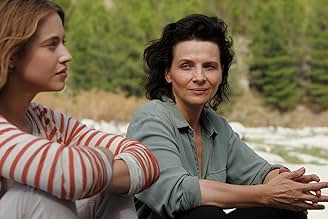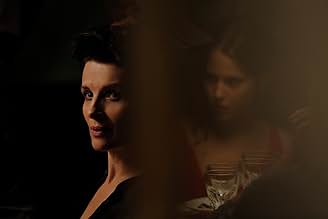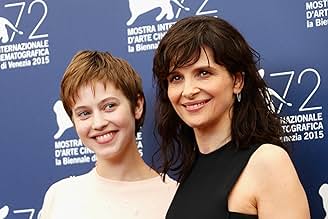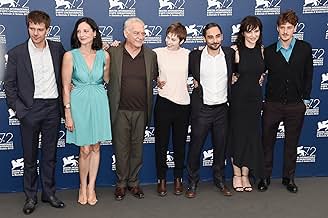VALUTAZIONE IMDb
6,5/10
2672
LA TUA VALUTAZIONE
Una madre incontra inaspettatamente la fidanzata di suo figlio in una villa in Sicilia e la conosce mentre aspetta l'arrivo del figlio.Una madre incontra inaspettatamente la fidanzata di suo figlio in una villa in Sicilia e la conosce mentre aspetta l'arrivo del figlio.Una madre incontra inaspettatamente la fidanzata di suo figlio in una villa in Sicilia e la conosce mentre aspetta l'arrivo del figlio.
- Regia
- Sceneggiatura
- Star
- Premi
- 7 vittorie e 9 candidature totali
Recensioni in evidenza
I've seen it as a part of Italian Cinema Festival in Lisbon, the director was there. To the end I wondered how this relatively young man could make it - bring a spectator in the intersection of sorrow, enchantment and tension and keep him there the whole film.
There was a lot of wondering in general - during and after, - a lot of associations and interpretations. The film keeps you very alive in spite of difficult theme, awaken, wanting something from the characters, wanting to be like the characters, asking questions, enjoying slow beautiful shots, colors, landscapes, soundtrack, actresses. Remembering other roles of Juliette Binoche as in "Three colors: Blue" and "Paris, je t'aime", other astonishingly beautiful Italian films like "Stealing beauty". Wishing it to resolute and stop and to continue after titles.
J.S. Foer said "humorous is the only way to tell a sad story". "L 'attesa" with very convincing vitality states that the only way to tell a sad story is beautiful.
There was a lot of wondering in general - during and after, - a lot of associations and interpretations. The film keeps you very alive in spite of difficult theme, awaken, wanting something from the characters, wanting to be like the characters, asking questions, enjoying slow beautiful shots, colors, landscapes, soundtrack, actresses. Remembering other roles of Juliette Binoche as in "Three colors: Blue" and "Paris, je t'aime", other astonishingly beautiful Italian films like "Stealing beauty". Wishing it to resolute and stop and to continue after titles.
J.S. Foer said "humorous is the only way to tell a sad story". "L 'attesa" with very convincing vitality states that the only way to tell a sad story is beautiful.
Without any planning, in the last few days I saw 2 films starring Lou de Laâge and although with completely different characters in both films (L'attesa and Respire) I was pleased with her capacity to enter the role . Juliette Binoche is as always one of the best actresses of her generation and always make great performances. About this L'attesa I can say that although in some parts the film goes a bit too long in the suspense, the story is well written and better represented by the cast. The image plans are very good but sometimes too still. But it is a must see film. A very good work from Francesco Di Giacomo However the story is never totality told to the audience, letting one always thinking ahead.
Plot and character are the classic drivers of cinema but there are other forces of equal impact. Some films are driven more by what does not happen than what does, and photographic technique can transform inaction into deep meaning. This is the case in The Wait (2016), a film title that describes both the story's narrative arc and how it will be experienced by most viewers. Long silent close-ups that record little more than an eyebrow muscle tightening or the strands of hair on a neck are used to convey emotional power of surprising intensity.
Based entirely on the interaction between two women and the inability of one to reveal a painful truth to the other, the plot and character range is unusually sparse. The story opens with a funeral and the palpable raw grief on the face of a mother who has lost a son. Anna (Juliette Binoche) is in a deep dark place when she takes a call from beautiful young Jeanne (Lou de Laage) who asks why her son Giuseppe did not meet her at the airport. Anna invites Jeanne to wait for him at the Sicilian family villa, knowing he will never come. The pair move from a strained and awkward start to a warm friendship, all the while with Jeanne confused and Anna struggling with suppressed emotional turmoil. Anna has Giuseppe's cell phone and listens to Jeanne's desperate calls to her son, but withholding the truth gives him a tangible presence that keeps him alive and eases Anna's pain. For as long as she can gaze upon Jeanne, she can see through her dead son's eyes and share his delight in her innocence and charm.
This story rests entirely on the extraordinary ability of its two stars to convey the full gamut of emotion with total authenticity. The face of Binoche in particular is like a canvas onto which she paints every colour of the rainbow, with subtle shifts of expression that span joyful laughter to the very edge of sanity. Many viewers will find this a difficult film to watch because of the gradually escalating tension created by Anna holding back the truth from Jeanne, and this transforms the drama into a psychological thriller. It is impossible not to judge Anna or not to consider how we would handle such a situation, and this self-reflective process only heightens tensions both inside the film and within ourselves. The performances could easily have slipped into a melodrama, but instead, the minimalist dialogue and slow pace creates an open space into which is hung a finely wrought portrait of parental grief.
Based entirely on the interaction between two women and the inability of one to reveal a painful truth to the other, the plot and character range is unusually sparse. The story opens with a funeral and the palpable raw grief on the face of a mother who has lost a son. Anna (Juliette Binoche) is in a deep dark place when she takes a call from beautiful young Jeanne (Lou de Laage) who asks why her son Giuseppe did not meet her at the airport. Anna invites Jeanne to wait for him at the Sicilian family villa, knowing he will never come. The pair move from a strained and awkward start to a warm friendship, all the while with Jeanne confused and Anna struggling with suppressed emotional turmoil. Anna has Giuseppe's cell phone and listens to Jeanne's desperate calls to her son, but withholding the truth gives him a tangible presence that keeps him alive and eases Anna's pain. For as long as she can gaze upon Jeanne, she can see through her dead son's eyes and share his delight in her innocence and charm.
This story rests entirely on the extraordinary ability of its two stars to convey the full gamut of emotion with total authenticity. The face of Binoche in particular is like a canvas onto which she paints every colour of the rainbow, with subtle shifts of expression that span joyful laughter to the very edge of sanity. Many viewers will find this a difficult film to watch because of the gradually escalating tension created by Anna holding back the truth from Jeanne, and this transforms the drama into a psychological thriller. It is impossible not to judge Anna or not to consider how we would handle such a situation, and this self-reflective process only heightens tensions both inside the film and within ourselves. The performances could easily have slipped into a melodrama, but instead, the minimalist dialogue and slow pace creates an open space into which is hung a finely wrought portrait of parental grief.
There is a kind of celebration that is cathartic and without it, grief can not release itself from its prison. In the space between loss and acceptance, lie denial and the hope for a miracle, for the light to shine through the heart.
In this extraordinary period of denial, time stretches into moments of grief, anger and hope, the meeting of reality with the loss of love is undefined, is fated to be revealed but if it can not, then the actions of those frozen in that vast expanse of waiting can not be predicted.
This is calm before the storm but the storm never arrives, it is the house that creaks with the stuff of haunting but the ghosts only wander into dreams.
L'attesa (The Wait) is shot in an old Sicilian villa, it moves in lingering pauses in which the exalted photographic beauty of this extended suspension, truth attempting to surface but underwater. Binoche carries the deepening mystery in precise nuanced expression. The nails hammered into the walls to shroud mirrors, the lime annointment of olive trees bleaches the trunk bone white, and awaiting the miracle, knowing in truth is freedom, unable to see past belief and hope.
Excellent film in every respect, music, photography and direction. Resolution is unavailable as the echoes of celebration fade.
In this extraordinary period of denial, time stretches into moments of grief, anger and hope, the meeting of reality with the loss of love is undefined, is fated to be revealed but if it can not, then the actions of those frozen in that vast expanse of waiting can not be predicted.
This is calm before the storm but the storm never arrives, it is the house that creaks with the stuff of haunting but the ghosts only wander into dreams.
L'attesa (The Wait) is shot in an old Sicilian villa, it moves in lingering pauses in which the exalted photographic beauty of this extended suspension, truth attempting to surface but underwater. Binoche carries the deepening mystery in precise nuanced expression. The nails hammered into the walls to shroud mirrors, the lime annointment of olive trees bleaches the trunk bone white, and awaiting the miracle, knowing in truth is freedom, unable to see past belief and hope.
Excellent film in every respect, music, photography and direction. Resolution is unavailable as the echoes of celebration fade.
This is a haunting movie, but I think it could have used a tad more plot. Even Binoche's genius for ambiguous facial expressions strains to paper over deficiencies in the story.
I was intrigued to see that it was based on a Pirandello play, but "based" is too strong - it's at best inspired by "La vita che ti diedi", and from what I can tell (I'm not fluent in Italian) the movie omits most of the play's boldest psychological points.
I was intrigued to see that it was based on a Pirandello play, but "based" is too strong - it's at best inspired by "La vita che ti diedi", and from what I can tell (I'm not fluent in Italian) the movie omits most of the play's boldest psychological points.
Lo sapevi?
- Quiz"L'attesa" is a period of time whose duration is unknown and therefore it symbolizes a real act of faith. In this case, this act for Anna and Jeanne consists in waiting for the return of Giuseppe, the son of Anna and Jeanne's boyfriend, with the difference that the first knows the truth, while the second lives in the mystery. The return of Giuseppe takes on the meaning of a miracle. The song "Waiting for the miracle" emphasizes this detail.
- BlooperAbout one half hour into the movie Binoche cracks an egg into a frying pan, thereby breaking the yolk. However, when she serves it to her son's girlfriend the yolk is whole.
- Citazioni
Anna Remigi: Jealousy means that there is still desire.
- ConnessioniFeatures Arrangiatevi (1959)
- Colonne sonoreOrchestral Loop
Music by Ben Lukas Boysen
Published by Erased Tapes Music
I più visti
Accedi per valutare e creare un elenco di titoli salvati per ottenere consigli personalizzati
- How long is L'attesa?Powered by Alexa
Dettagli
Botteghino
- Budget
- 3.200.850 € (previsto)
- Lordo Stati Uniti e Canada
- 55.804 USD
- Fine settimana di apertura Stati Uniti e Canada
- 5686 USD
- 1 mag 2016
- Lordo in tutto il mondo
- 1.010.766 USD
- Tempo di esecuzione1 ora 40 minuti
- Colore
- Proporzioni
- 2.35 : 1
Contribuisci a questa pagina
Suggerisci una modifica o aggiungi i contenuti mancanti






























